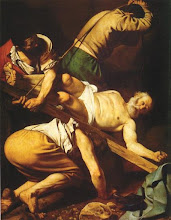The "new" deadly sins...
ROME — Drug pushers, the obscenely rich, environmental polluters and “manipulative” genetic scientists beware — you may be in danger of losing your mortal soul unless you repent.
After 1,500 years the Vatican has brought the seven deadly sins up to date by adding seven new ones for the age of globalization. The list, published yesterday in L’Osservatore Romano, the Vatican newspaper, came as the Pope deplored the “decreasing sense of sin” in today’s “secularized world” and the falling numbers of Roman Catholics going to confession.
The Catholic Church divides sins into venial, or less serious, sins and mortal sins, which threaten the soul with eternal damnation unless absolved before death through confession and penitence.
It holds mortal sins to be “grave violations of the Ten Commandments and the Beatitudes,” including murder, contraception, abortion, perjury, adultery and lust.
The Catechism of the Catholic Church states that “immediately after death the souls of those who die in a state of mortal sin descend into Hell.”
Although there is no definitive list of mortal sins, many believers accept the broad seven deadly sins or capital vices laid down in the 6th century by Pope Gregory the Great and popularized in the Middle Ages by Dante in "The Inferno": lust, gluttony, avarice, sloth, anger, envy and pride.
/**/
Christians are exhorted instead to adhere to the seven holy virtues: chastity, abstinence, temperance, diligence, patience, kindness and humility.
Bishop Gianfranco Girotti, head of the Apostolic Penitentiary, the Vatican body which oversees confessions and plenary indulgences, said after a week-long Lenten seminar for priests that surveys showed 60 percent of Catholics in Italy no longer went to confession.
He said that priests must take account of “new sins which have appeared on the horizon of humanity as a corollary of the unstoppable process of globalization.” Whereas sin in the past was thought of as being an individual matter, it now has “social resonance.”
“You offend God not only by stealing, blaspheming or coveting your neighbor’s wife, but also by ruining the environment, carrying out morally debatable scientific experiments, or allowing genetic manipulations which alter DNA or compromise embryos,” he said.
Bishop Girotti said that mortal sins also included taking or dealing in drugs, and social injustice which caused poverty or “the excessive accumulation of wealth by a few.”
He said that two mortal sins which continued to preoccupy the Vatican were abortion, which offended “the dignity and rights of women,” and pedophilia, which had even infected the clergy itself and so had exposed the “human and institutional fragility of the Church.”
The mass media had “blown up” the issue “to discredit the Church,” but the Church itself was taking steps to deal with it, according to Girotti.
Addressing the Apostolic Penitentiary seminar, the Pope said there was “a certain disaffection” with confession among the faithful. Priests had to show “divine tenderness for penitent sinners” and admit their own failings.
“Those who trust in themselves and in their own merits are, as it were, blinded by their own ‘I’, and their hearts harden in sin. Those who recognize themselves as weak and sinful entrust themselves to God, and from Him obtain grace and forgiveness.”
The Pope also complained that an increasing number of people in the secularized West were “making do without God.”
He said that hedonism and consumerism had even invaded “the bosom of the Church itself, deeply undermining the Christian faith from within, and undermining the lifestyle and daily behavior of believers.”
Eastern Catholics do not recognize the same distinction between mortal and venial sins as the Western or Latin Church does, nor do they believe that those people who die in a state of sin are condemned to automatic damnation.










.jpg)

.jpg)




 I am taking the oldest child along....she's had a rough few months at school, having "outed" some of her peers for bullying. So now she's on the receiving end, feeling that she did the right thing, but being friendless at 14 is not easy. So a mini-break from the wretched she-dogs of the quasi-Catholic Jr. High will be good for her. She, being a major whitey, will be under the cabana, while I, with some strange ability to tan that comes every other generation in my Irish-German-Alsatian genetic stew, will be brown as a coconut within 48 hours. (Yes, I know we are not supposed to do that to our skin anymore, but given the long, dark, cold, snowy upstate winter, 1) don't really give a damn, and 2) let's just say I consider it therapy for my S.A.D. issues. Hmmmm.....I wonder if it's a tax writeoff....?)
I am taking the oldest child along....she's had a rough few months at school, having "outed" some of her peers for bullying. So now she's on the receiving end, feeling that she did the right thing, but being friendless at 14 is not easy. So a mini-break from the wretched she-dogs of the quasi-Catholic Jr. High will be good for her. She, being a major whitey, will be under the cabana, while I, with some strange ability to tan that comes every other generation in my Irish-German-Alsatian genetic stew, will be brown as a coconut within 48 hours. (Yes, I know we are not supposed to do that to our skin anymore, but given the long, dark, cold, snowy upstate winter, 1) don't really give a damn, and 2) let's just say I consider it therapy for my S.A.D. issues. Hmmmm.....I wonder if it's a tax writeoff....?) So, I shall watch the sun set on my 30's and enjoy the halftime show for a few days, then back to reality.
So, I shall watch the sun set on my 30's and enjoy the halftime show for a few days, then back to reality. 

























